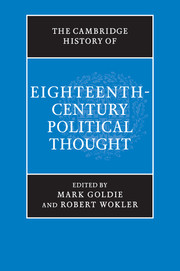Book contents
- Frontmatter
- Introduction
- Part I The ancien régime and its critics
- 1 The spirit of nations
- 2 The English system of liberty
- 3 Scepticism, priestcraft, and toleration
- 4 Piety and politics in the century of lights
- Part II The new light of reason
- Part III Natural jurisprudence and the science of legislation
- Part IV Commerce, luxury, and political economy
- Part V The promotion of public happiness
- Part VI The Enlightenment and revolution
- Biographies
- Bibliography
- Index
- References
1 - The spirit of nations
from Part I - The ancien régime and its critics
Published online by Cambridge University Press: 28 March 2008
- Frontmatter
- Introduction
- Part I The ancien régime and its critics
- 1 The spirit of nations
- 2 The English system of liberty
- 3 Scepticism, priestcraft, and toleration
- 4 Piety and politics in the century of lights
- Part II The new light of reason
- Part III Natural jurisprudence and the science of legislation
- Part IV Commerce, luxury, and political economy
- Part V The promotion of public happiness
- Part VI The Enlightenment and revolution
- Biographies
- Bibliography
- Index
- References
Summary
Lessons from the Franks and the Greeks
Montesquieu’s L’Esprit des lois (The Spirit of the Laws, 1748) stands among the most intellectually challenging and inspired contributions to political theory in the eighteenth century. The scope of the book, its sustained reflection, its impact on social and political debates throughout Europe, as well as its enduring influence make it an exceptional work. As its subtitle indicates, it purports to examine the relation laws must have to the specific constitution, civil society, and physical circumstances of the country in which they are being made or enforced. To apprehend the spirit of a nation’s laws is thus to understand the relationship which pertains between a number of social, political, and material factors peculiar to that nation. What the remainder of the subtitle further suggests, and the body of the text makes explicit, is that the knowledge which such an examination both requires and produces is historical in nature. In linking history and law and making both central to political theory Montesquieu, together with the Scottish school of political economy, which he profoundly influenced, set the tone and form of modern social and political thought. He paved the way leading to Hegel, who recognised the true nature of his genius better than most of his admirers (Hegel 1991, pp. 29, 283, 310–11; 1999, p. 175; see also Carrithers 2001a).
- Type
- Chapter
- Information
- Publisher: Cambridge University PressPrint publication year: 2006
References
- 2
- Cited by



